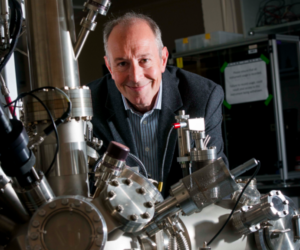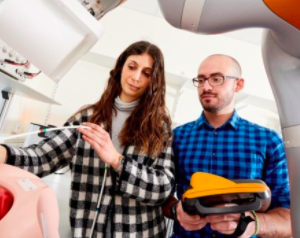The Physics and Engineering work stream is jointly led by Prof Steve Evans (Physics), Assoc Prof Pete Culmer (Engineering), and Prof Pietro Valdastri (Robotics). Engineering benefits from access to the Centre for Innovative Manufacturing in Medical Devices, and EPSRC- funded National Facility for Innovative Robotic Systems. The different components are brought together through the EPSRC-funded Leeds Innovation in Surgical Technologies (LIST) group – a forum for interdisciplinary research.
Areas of expertise include nanotechnology-related research in theranostic materials for cancer treatment and microfluidics for high throughput single cell phenotyping; next generation instruments, haptic feedback systems, and devices for incontinence; medical capsule robots for endoscopy, including a magnetic platform for painless colonoscopy, and an ultra-low-cost Hydrojet gastroscope.
Continence technologies whitepaper: Informing new engineering science research
The Pathology work stream boasts the largest clinical academic pathology department in the UK, with sector-leading digital pathology, state of the art molecular biology facilities, access to HTA-accredited human tissue banks, a GI microbiome research programme, new measures of response to neoadjuvant therapy, and an international reputation for pathological assessment of surgical quality through 30 NIHR and international clinical trials.
This is led by Dr N West, academic consultant histopathologist, supported by Prof P Quirke, Dr D Treanor, and NIHR Academic Clinical Fellows (ACF’s).
Dr N West and Prof P Quirke are world leaders in pathological assessment of surgical quality, including quality improvement programmes embedding total mesorectal excision, complete mesocolic resection, and extra-levator abdominoperineal excision into clinical practice with demonstrable improvements in cancer outcomes.
Northern Pathology Imaging Co-operative
Quick snapshot of Pathology expertise and capability
The Clinical Trials work stream is led by the Leeds Clinical Trials Research Unit, under the Directorship of Prof J Brown. It is a National Cancer Research Institute (NCRI) accredited and UKCRC Registered Clinical Trials Unit. It has an international reputation for the design and delivery of innovative early to late phase clinical trials. In 2015, the CTRU became a RCS Engl. Surgical Trials Centre (RCS-STC) with clinical themes in colorectal, vascular, HPB, and urological surgery. The CTRU has contributed to improved surgical outcomes and healthcare efficiency through its clinical trials research in minimally invasive surgery, including the MRC/NIHR CLASICC and MRC/NIHR ROLARR trials, which have been instrumental in changing surgical practice and informing healthcare decision-making across the globe.
The Health Economics work stream is led by Dr. B. Shinkins, lead of Test Evaluation Group, Academic Unit of Health Economics (AUHE). She is lead health economist for the Surgical MedTech Co-operative with particular expertise in health economic evaluations of tests and devices. She is supported by D Meads, A Vargas- Palacios. AUHE collaborates closely with the CTRU on a large portfolio of economic evaluations of surgical technologies.
Early economic modelling informed the development of our intra-abdominal platform for laparoscopic surgery (NIHR i4i), including market headroom analysis and commercialisation strategy.
The Business Development and Commercialisation work stream will focus on creating a pipeline of industry-led projects and progressing these through to transaction. Supporting innovators with market research, event attendance, grant applications and proof-of-concept funding will enable the creation of networks with supporting agencies and investors.
It will also support translational development of academic-generated IP developed through the NIHR Surgical MIC. Although there is no shortage of surgical innovations, few devices make it into clinical practice; only 9.8% of surgical innovations are translated to first-in-man studies, with ~1% being widely adopted. Our Surgical Technology Testbed will play a key role in facilitating the commercialisation of important surgical innovations by enabling the early and late phase evaluation for these innovations.
This theme will also work with our partners to develop suitable training events and workshops to support clinicians and industry with their innovations.



